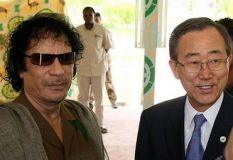UN chief defends Libya as venue for Darfur talks
September 10, 2007 (UNITED NATIONS) — U.N. Secretary-General Ban Ki-moon Monday defended Libya as the venue for crucial peace talks on Darfur despite its spotty human rights record.
 Ban and the Sudanese government last week set Oct 27 as a date for talks in Tripoli between the Sudan government and Darfur rebels to push for peace ahead of the deployment of 26,000 peacekeepers in Darfur.
Ban and the Sudanese government last week set Oct 27 as a date for talks in Tripoli between the Sudan government and Darfur rebels to push for peace ahead of the deployment of 26,000 peacekeepers in Darfur.
Before the Libya talks, Ban told reporters he would hold a high-level meeting on Darfur on Sept. 21 in New York, shortly before the annual U.N. General Assembly debate.
The secretary-general, who just returned from a trip to Sudan, Chad and Libya, said that Tripoli was chosen because “they had initiated a very important mediating role” since 2006, including meetings in April and July.
While saying it was his obligation to protect human rights, Ban said “there may be many different understandings or, again, interpretations” but that he appreciated “Libya’s flexibility and kind gesture to hold this meeting.”
“They have experience and they have know-how, and there are quite a number of leaders of movements and groups residing in Libya. So that was one of the factors,” Ban added.
Human rights conditions in Libya improved somewhat in 2006 but the government still restricts freedom of expression, bans political parties, imprisons critics and practices torture, Human Rights Watch says.
But a potential obstacle to the talks is Paris-based rebel leader Abdel Wahid Mohamed el-Nur, founder of the large Sudan Liberation Movement, who has said he would not attend.
But despite el-Nur’s prominence, Ban said “that as a matter of principle, everybody should be given equal opportunity and equal attention. Giving any prominent attention to any particular person is not desirable.”
PEACEKEEPING FORCE
Ban said that the joint United Nations-African Union peacekeeping force, now being organized, had received “more contributions than we may actually need” except in specialized areas such as air transportation, financial experts and logistics.
“We would like to have contributions from non-African Union countries, particularly European countries,” he said, adding he had discussed the issue with European leaders.
African nations have offered enough infantry troops but Ban, in a recent report, said some lacked “the equipment necessary to implement their required tasks.”
Diplomats, speaking on condition of anonymity said infantry soldiers from non-African nations would be needed but that the African Union was objecting.
The United Nations has maintained it would honor the fundamental “African character” of the force, as Khartoum has insisted” but that did not mean other nations were excluded.
The lack of specialized troops, key to the functioning of the force, is also holding up deployment, with peacekeeping officials unable to keep a suggested target date of August 31 of committed troop contributors.
(Reuters)
